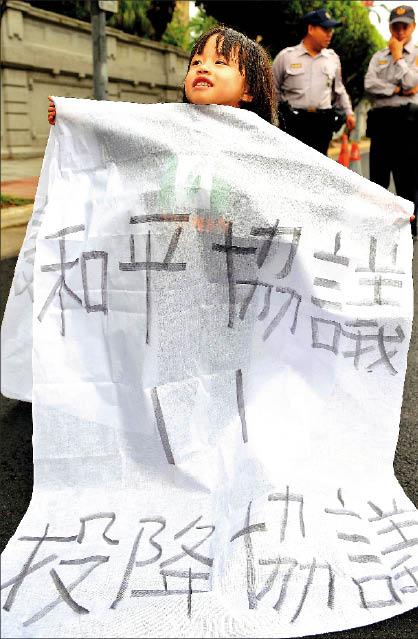A leaked US cable shows that American Institute in Taiwan (AIT) Chairman Raymond Burghardt warned President Ma Ying-jeou (馬英九) in 2007 that cross-strait dialogue on various issues, including a peace agreement, could be at the expense of US arms sales to Taiwan.
Following heated debate on whether to start political talks with China that could potentially lead to unification if Ma is re-elected in January after he proposed the idea on Monday, Ma said on Thursday that a pact would not be signed unless strict prerequisites were met.
However, a cable dated June 18, 2007, and released by WikiLeaks on Aug. 30 details a meeting between Ma, then the Chinese Nationalist Party’s (KMT) presidential candidate, and Burghardt, which appears to suggest otherwise.

Photo: Chu Pei-hsiung, Taipei Times
The cable quoted Ma as telling Burghardt that he “would accept a peace agreement of either limited or unlimited duration” if elected president on March 20, 2008.
Burghardt, in the company of then-AIT director Stephen Young, visited Ma, who was accompanied by his top national security aide, Su Chi (蘇起), on June 16.
During their talks, Ma told the US officials that he would implement “five do’s” and honor then-president Chen Shui-bian’s (陳水扁) “four noes” pledge if he were elected president.
The “five do’s” included resuming dialogue with Beijing, establishing military confidence-building measures, creating a China--Taiwan common market, reaching a modus vivendi on international organizations and expanding cross-strait cultural and educational exchanges, the cable says.
The cable says Ma told Burghardt that he “would condition any negotiation of a peace agreement on the PRC’s [People’s Republic of China] removal of missiles aimed at Taiwan, adding that he would accept a peace agreement of either limited or unlimited duration.”
Burghardt predicted that China would attempt to condition any dialogue on Taiwan suspending arms purchases from the US, the cable says.
Both Ma and Su in response said that would be “unacceptable.”
They said Beijing would tolerate continued US arms sales as long as Taiwan’s leadership did not antagonize China by pushing an independence agenda, the cable says.
When they talked about the 2008 presidential election, Ma told Burghardt that then-Democratic Progressive Party (DPP) presidential candidate Frank Hsieh (謝長廷) had rehashed charges that Ma was “a Mainlander,” that he “does not love Taiwan” and that he intended to counter such attacks by emphasizing the KMT would stabilize cross-strait relations, which he added would produce economic opportunities.
“Unlike the DPP, the KMT enjoys a strong intra-party consensus on cross-strait policy. Moreover, while the PRC does not trust President Chen or the DPP, the KMT already shares common ground with Beijing, both sides having accepted the ‘one China, different interpretations’ formulation of the ‘1992 consensus,’” Ma is quoted as saying in the cable.
With a KMT government, and under proper circumstances, negotiations for a peace agreement and for economic cooperation could begin immediately, the cable quotes Ma as saying.
Furthermore, Ma said that a KMT government would “remove the question of Taiwan independence from the table,” stabilizing cross-strait relations and thereby enhancing Taiwan’s attractiveness to foreign investors and its trading partners, the cable says.

Taiwan yesterday condemned the recent increase in Chinese coast guard-escorted fishing vessels operating illegally in waters around the Pratas Islands (Dongsha Islands, 東沙群島) in the South China Sea. Unusually large groupings of Chinese fishing vessels began to appear around the islands on Feb. 15, when at least six motherships and 29 smaller boats were sighted, the Coast Guard Administration (CGA) said in a news release. While CGA vessels were dispatched to expel the Chinese boats, Chinese coast guard ships trespassed into Taiwan’s restricted waters and unsuccessfully attempted to interfere, the CGA said. Due to the provocation, the CGA initiated an operation to increase

CHANGING LANDSCAPE: Many of the part-time programs for educators were no longer needed, as many teachers obtain a graduate degree before joining the workforce, experts said Taiwanese universities this year canceled 86 programs, Ministry of Education data showed, with educators attributing the closures to the nation’s low birthrate as well as shifting trends. Fifty-three of the shuttered programs were part-time postgraduate degree programs, about 62 percent of the total, the most in the past five years, the data showed. National Taiwan Normal University (NTNU) discontinued the most part-time master’s programs, at 16: chemistry, life science, earth science, physics, fine arts, music, special education, health promotion and health education, educational psychology and counseling, education, design, Chinese as a second language, library and information sciences, mechatronics engineering, history, physical education

The Chinese military has boosted its capability to fight at a high tempo using the element of surprise and new technology, the Ministry of National Defense said in the Quadrennial Defense Review (QDR) published on Monday last week. The ministry highlighted Chinese People’s Liberation Army (PLA) developments showing significant changes in Beijing’s strategy for war on Taiwan. The PLA has made significant headway in building capabilities for all-weather, multi-domain intelligence, surveillance, operational control and a joint air-sea blockade against Taiwan’s lines of communication, it said. The PLA has also improved its capabilities in direct amphibious assault operations aimed at seizing strategically important beaches,

‘MALIGN PURPOSE’: Governments around the world conduct espionage operations, but China’s is different, as its ultimate goal is annexation, a think tank head said Taiwan is facing a growing existential threat from its own people spying for China, experts said, as the government seeks to toughen measures to stop Beijing’s infiltration efforts and deter Taiwanese turncoats. While Beijing and Taipei have been spying on each other for years, experts said that espionage posed a bigger threat to Taiwan due to the risk of a Chinese attack. Taiwan’s intelligence agency said China used “diverse channels and tactics” to infiltrate the nation’s military, government agencies and pro-China organizations. The main targets were retired and active members of the military, persuaded by money, blackmail or pro-China ideology to steal